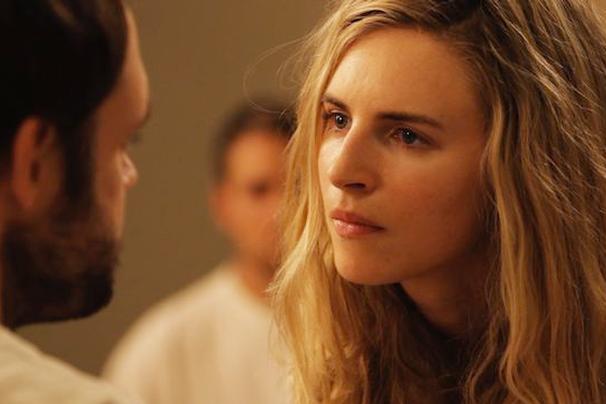Review
>
ANOTHER EARTH – Worth A Ticket: Tiny Story With Big Ambitions
For ANOTHER EARTH, the Sundance Film Festival went exactly the way it’s supposed to. The low-key picture was made on a miniscule budget (a few hundred thousand dollars) by complete unknowns, director/cinematographer/editor/co-writer/co-producer Mike Cahill and star/co-writer/co-producer Brit Marling, with far less buzz than many of the other titles at the festival, but by the time Park City emptied out, it had won a Festival award and something more valuable: a US distribution deal through Fox Searchlight. (Marling had an even better week: another movie she starred in, co-wrote and co-produced, Sound of My Voice, was also acquired by Searchlight and will be opening soon.)
Another Earth became a festival darling because it takes a lot of typical Sundance elements–a quest for personal redemption mixed with troubled romance and much contemplation of fate–and gives them an original, unexpected sci-fi bounce. Marling plays Rhoda, a gifted science student who does something horribly careless the night she finds out that she’s gotten into MIT, something that changes her life forever. It also changes the life of John (William Mapother, perhaps best known as Ethan on Lost). Some years later, Rhoda tries to apologize to John, who now lives a secluded existence far from others, but she can’t quite make herself do it; instead, she becomes part of his life by pretending to be from his housekeeping service. The two become increasingly close, but of course her secret will ultimately have to come out.
 So far, so indie film. What makes Another Earth different is that its title is (among other things) quite literal: as all these events are transpiring, the world has discovered that a parallel planet to Earth exists, and is drawing closer to this one. Communication is established between the planets, and travel to the second Earth is going to begin. There is the revelation (mild spoiler alert–it’s in the trailer) that at least to some extent, the new planet is a duplicate of ours, even including the people who inhabit it. On a thematic level, this underscores the movie’s exploration of the possibility of new beginnings, and the question of whether the lives we lead are in fact our destinies.
So far, so indie film. What makes Another Earth different is that its title is (among other things) quite literal: as all these events are transpiring, the world has discovered that a parallel planet to Earth exists, and is drawing closer to this one. Communication is established between the planets, and travel to the second Earth is going to begin. There is the revelation (mild spoiler alert–it’s in the trailer) that at least to some extent, the new planet is a duplicate of ours, even including the people who inhabit it. On a thematic level, this underscores the movie’s exploration of the possibility of new beginnings, and the question of whether the lives we lead are in fact our destinies.Cahill and Marling do a marvelous job balancing the personal story of Rhoda and John with the (extremely low-tech) fantasy plot, culminating in an ending that manages to be satisfying even as it makes one hope for a sequel. Another Earth is both emotionally involving and intellectually provocative, a neat trick even for filmmakers who have lots of extra zeroes on their production budgets. Cahill provides evocative photography, and there’s effective music by the group Fall On Your Sword. The sparing special effects are lyrical, and despite the tiny budget, there’s a terrifically executed trick sequence in the first reel.
Wearing her acting hat, Marling gives a lovely performance as Rhoda, torn between guilt and yearning; Mapother, who’s often played negative characters in the past (he was In the Bedroom‘s terrible ex-husband) does a fine job with a far more rounded role. The story of the two of them could have been a satisfying film by itself; the added layer of speculative fiction makes it more than that.
Another Earth has some of the flaws familiar in low-budget indie films–metaphoric details (Rhoda works with a wise, disabled Indian man) are obvious, there are awkward stretches of concentrated moodiness. But the picture works, and it identifies potentially major new talents. That’s a lot to accomplish with little more than dreams as overhead.
.



